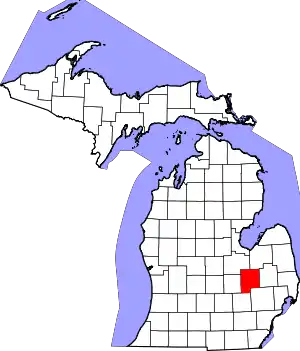Flushing, Michigan
Flushing is a city in Genesee County in the U.S. state of Michigan. The population was 8,389 at the 2010 census. Flushing is considered a suburb of Flint. It is situated within the survey area of Flushing Charter Township, but is administratively autonomous.
Flushing, Michigan | |
|---|---|
| City of Flushing | |
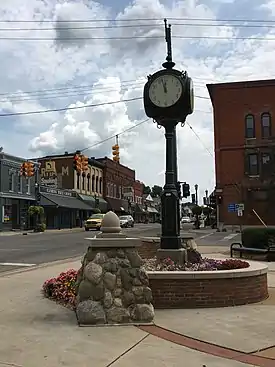 Downtown Flushing looking east along Main Street from the Flint River | |
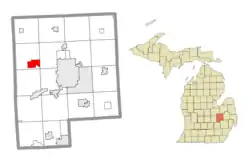 Location within Genesee County | |
 Flushing Location within the state of Michigan | |
| Coordinates: 43°03′47″N 83°51′04″W | |
| Country | United States |
| State | Michigan |
| County | Genesee |
| Platted | 1840 |
| Incorporated | 1877 (village) 1964 (city) |
| Government | |
| • Type | Council–manager |
| • Mayor | Joe Karlichek |
| • Mayor Pro-Tem | Ed Sullivan |
| • City manager | Brad Barrett |
| Area | |
| • Total | 3.74 sq mi (9.68 km2) |
| • Land | 3.61 sq mi (9.36 km2) |
| • Water | 0.12 sq mi (0.32 km2) 4.49% |
| Elevation | 699 ft (213 m) |
| Population | |
| • Total | 8,389 |
| • Estimate (2019)[3] | 7,880 |
| • Density | 2,180.41/sq mi (841.75/km2) |
| Time zone | UTC-5 (EST) |
| • Summer (DST) | UTC-4 (EDT) |
| ZIP code(s) | 48433 |
| Area code(s) | 810 |
| FIPS code | 26-29200[4] |
| GNIS feature ID | 0626199[5] |
| Website | www |
Flushing originated as a mill town in the mid-1830s. Its location along the Flint River, the county's largest river, was a decisive factor in its settlement. Water power potential was a significant determinant for the selection of the settlement areas throughout the nineteenth century. In addition to its water power, the area around Flushing was also well suited to agricultural pursuits.[6]
The name Dover originally was selected for the new village until it was discovered that the name already was in use in Lenawee County. Charles Seymour, Sr., former resident of Flushing, Long Island, subsequently named the new community after the village in New York State.[7][8]
History
The earliest known inhabitants of Flushing were the Sauk Indians.[9] Evidence suggesting that the second battle of Skull Island was fought in Flushing, including mass burial mounds, were found along the Flint river near the Bailey farm; now the present day Flushing Valley Golf Club. Mounds were observed in 1833 or 1834 and about 20 mounds in total.[10][11][12]
In 1835, Charles Seymour Sr. from New York state came to the Flushing area after purchasing land there. He formed a partnership with Horace Jerome in 1836 who had purchased water rights in the vicinity. In their partnership, Seymour would provide pine timber while Jerome would build a mill. The saw mill was operational in the summer of 1837.[13] Jerome left Flushing after his wildcat bank, the Flint Rapids Bank, failed in 1838. A village plat on sections 26 and 27, bearing the name of Flushing and named after the township in which it was located, was laid out December 3, 1840 by Charles Seymour Sr. In 1843 Charles sold out to his brother James Seymour. James then made an additional plat, 31, in 1847.[7][9]
in 1850, a flat-bottomed boat established early transportation between Flint and Flushing.[14]
On July 30, 1873, village women formed the Flushing Ladies' Association.[9]
In 1874, a subscription private fire department, the Wolverine Fire Company, was formed with 35 members and Arza N. Niles as first chief engineer. Wolverine paid for a small engine designed by Captain Haas of Flint of his own design and patent.[9]
Flushing was incorporated as a village on March 21, 1877 with its first election held on May 8, 1877. Oscar F. Clarke was elected as the first village president. After incorporation, the fire company turned over its equipment to the village. In 1878, the Haas engine was instrument in containing a major fire in the business district to just a saloon and hotel.[9]
The Flushing Patrol, the village's first professional newspaper, was founded on October 18, 1878 by D. C. Ashmun.[9] In 1880 the paper sold for $1.50 per year.[15]
The paper would cost 1 dollar per year. The paper touts "The Interests of Flushing and Vicinity Will Be Observed Herein". On June 15, 1882, DeWitt C. Ashmun sold his paper, The Flushing Patrol, to Albert E. Ransom who changed its name to "The Flushing Observer".The Flushing Observer also published its first paper under that name on that same date[16][17]
The railroad was first brought to Flushing in 1888. Headed by John Ashley, the Toledo and Ann Arbor Railroad connected Flushing to Durand and Saginaw. Construction reached Flushing in July 1888. On Monday, Dec. 17, 1888, the first passenger train arrived from Saginaw. The fare from Flushing to Saginaw was 80 cents. Railroad engine crosses Flint river for the first time to Hart & Clark mill on February 7, 1889.[18] The line is currently owned by Huron and Eastern Railway, while the restored 1888 depot is now the Flushing Area Museum and Cultural Center.
March 25, 1895 vote passes 215 to 30 for $20,000 bond to build a water works system and electric light plant.[19] Water mains are first installed for use on Nov 1, 1895. Electricity was installed and ready for use on Nov 15, 1895, along with streetlights on Main St. By January 1897 there were 1600 incandescent lamps in the village.[20][21]
The Hart Flour Mill is destroyed in a fire on March 19, 1918. It was the 3rd Mill on the site and the 3rd to burn. The mill provided electricity until it burned down in 1918, leaving the village without power for 14 months until a new power plant was built.[22]
Main Street was paved in 1920.[21]
In May 1922 the current bridge on Main Street over the Flint river is completed. The bridge is a traditionally composed earth-filled closed spandrel concrete arch bridge built by L. Smith, H. A. and M. C. Nichols of Hastings, Michigan. The bridge was rehabilitated in 1998 adding new walkways and updated guardrails.[23] The first wood bridge was built on this site in 1839. A second wood bridge in 1856. A third wood bridge in 1872 and a double span iron bridge in 1880.[9] The iron bridge was removed in 1921.[24]
Tucker Memorial Pool was dedicated on July 1, 1956. The pool was built with money donated to the City from the will of Max Dealton Tucker who was born in Flushing.[21]
A book by Edmund G. Love titled The Situation in Flushing was published September 1, 1965. Edmund was born in Flushing and moved to Flint when he was 12. The book tells the account of his boyhood in the early 20th century.[25]
Completed in 1975 by Michigan Bell Telephone at a cost of $2.2 million, the now AT&T building sits on the site of the former home of James Seymour, brother of Charles Seymour. The home was built in the 1850s and torn down prior to Bell selecting the site.[26]
On Monday November 27, 2017, the northern loop set of municipalities, including Flushing, began receiving water from the Karegnondi Water Authority pipeline which is treated by theGenesee County Drain Commission Water and Waste Division.[27]
On January 15, 2020, District 2 councilwoman Karianne Martus resigned due to her new job at the Flint Farmers Market.[28] With no decision of the council to fill the vacancy, three more councilors resigned over the "discord". With no council quorum, the city is forced to hold a special election on August 4, 2020 to fill the vacancies.[29]
Government and politics
The city of Flushing is a Council-Manager form of government. The original city charter was adopted Nov 3, 1964 and updated Nov 2, 1993.[30] The Flushing Fire Department is an on call fire fighting service for the city as well as Flushing Township. The command staff consists of a chief, an assistant chief, a battalion chief, two captains and three lieutenants and other firefighters for a total of 20.[31] The City of Flushing Police Department provides police coverage 24 hours a day. The City of Flushing and Flushing township police regularly cooperate to improve services for both communities.[32] The township receives water from the Karegnondi Water Authority pipeline treated by the Genesee County Drain Commission Water and Waste Division.[27]
Flushing is part of the following:[33]
- Genesee County Commissioner District 7
- Michigan House of Representatives District 49
- State Senate District 32
- 67th District Court Division 1
- Michigan's 5th Congressional District
- Flushing Area Library operated by the Genesee District Library[34]
Education
Primary and secondary education are provided by Flushing Community Schools. Since 1954, Flushing is also home to Saint Robert Catholic School for Pre-K through 8th grade.[35]
Geography
The Flushing area is dominated by the Flint River Valley. The Flint River flows in a northerly direction along the southern and western portions of the city and continues north bisecting Flushing Township. The valley is characterized by rich sandy loam ideal for the growth of vegetation. As a result, the valley is characterized by dense woodlots containing many varieties of trees and providing scenic and natural settings for the area.[36]
According to the United States Census Bureau, the city has a total area of 3.79 square miles (9.82 km2), of which 3.62 square miles (9.38 km2) is land and 0.17 square miles (0.44 km2) is water.[37]
Neighborhoods
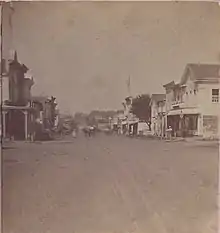
The Main Street Historic District includes buildings on Main St from Maple to 628 (East) Main St and the Flushing Depot at 431 W Main St. Properties in this district are listed on the National Register of Historic Places. 82 structures located on 22.4 acres of land create the district with commercial buildings reflecting ornate Italianate and early twentieth century styles constructed between 1850 and 1918 and residences exhibiting a wide variety of Greek Revival, Italianate, Queen Anne, Colonial Revival, and Bungaloid styles and their vernacular derivatives built from 1850 to 1932. Properties we added as part of the Main Street Historic Commercial District and the Genesee County MRA (Multiple Resource Area).[6][38]
Environment
Flushing's wastewater treatment includes an activated sludge treatment system installed in 1972 and a batch reactor treatment system that was added in 1988. Sewage is split between the two systems. Cleaned water is disinfected with UV light before being discharged into the Flint river. The plant is on 140 Industrial Drive and adjacent to the Riverview Trail.[39][40]
Pollution along the Flint river were once a problem but have vastly improved since the 1950s and 1960s after the Clean Water Act was enacted.[41] The river is a now popular place for fishing, canoeing and kayaking.[42]
The City of Flushing is supplied by surface water pumped from Lake Huron by the Karegnondi Water Authority and delivered by the Genesee County water supply system.[27] The water source was previously Great Lakes Water Authority (GLWA) until November 2017 when Genesee County switched sources.[43][44][27]
Electricity and natural gas are provided by Consumers Energy.[45]
Parks and recreation
- Flushing Riverview Trail is a city trail along the Flint River that connects to Flushing County Park
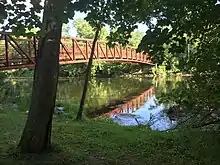
City parks
- Riverview Park is a 7.4 acre city park located along the Flint river between the Main Street bridge and the DPW.[46]
- Mutton (Bonnie View) Park is a 3.5 acre city park located on the corner of Coutant St and Chestnut St[46]
- Waterworks Park is a 4-acre city park off of Sunnyside Dr.[46]
- Eastview Veterans' Memorial Park is a 14.4 acres park located off of Coutant St near Elms Rd.[46]
- River Road Park is a 4.6 acre city park located off of River Rd near Morrish Rd.[46]
- Cornwell Park is a city park .2 acre park located downtown on the south west corner of Main St and Cherry St.[46] Cornwell park was established in 1961 after the relocation of Genesee Merchants Bank to Cherry St. The existing building was removed and the land donated to the village. A local business man Edgar L. Cornwell (October 17, 1866 - May 15, 1961) in his last civic gesture, established a trust fund to finance the conversion of the site into a park.[47]
Events
- Cruise Nights - Third Saturday of the Month April through September at the Flushing A near Riverview Park.[48]
- Summer Festival - June. Starts with a parade and lasts five days with a carnival in Riverview Park, music, food and other activities.[49]
- Art in the Park - June. Art vendors at Riverview Park.[50]
- Concerts in the Park - Wednesday evenings June through August at Riverview Park.[51]
- Movies in the Park - Saturday Evenings June through August at Riverview Park.[51]
- Harvest Festival - September. downtown Flushing.[52]
- Trail of Terror - October. Flushing Riverview Trail.[53]
- Candle Walk - December. Downtown Flushing.[54]
Demographics
| Historical population | |||
|---|---|---|---|
| Census | Pop. | %± | |
| 1860 | 406 | — | |
| 1870 | 687 | 69.2% | |
| 1880 | 690 | 0.4% | |
| 1890 | 965 | 39.9% | |
| 1900 | 900 | −6.7% | |
| 1910 | 938 | 4.2% | |
| 1920 | 1,169 | 24.6% | |
| 1930 | 1,723 | 47.4% | |
| 1940 | 1,806 | 4.8% | |
| 1950 | 2,226 | 23.3% | |
| 1960 | 3,761 | 69.0% | |
| 1970 | 7,190 | 91.2% | |
| 1980 | 8,624 | 19.9% | |
| 1990 | 8,542 | −1.0% | |
| 2000 | 8,348 | −2.3% | |
| 2010 | 8,389 | 0.5% | |
| 2019 (est.) | 7,880 | [3] | −6.1% |
| U.S. Decennial Census[55] | |||
2010 census
As of the census[2] of 2010, there were 8,389 people, 3,574 households, and 2,307 families residing in the city. The population density was 2,317.4 inhabitants per square mile (894.8/km2). There were 3,816 housing units at an average density of 1,054.1 per square mile (407.0/km2). The racial makeup of the city was 94.8% White, 2.4% African American, 0.4% Native American, 0.4% Asian, 0.3% from other races, and 1.6% from two or more races. Hispanic or Latino of any race were 2.2% of the population.
There were 3,574 households, of which 28.0% had children under the age of 18 living with them, 48.3% were married couples living together, 12.4% had a female householder with no husband present, 3.9% had a male householder with no wife present, and 35.5% were non-families. 32.7% of all households were made up of individuals, and 17.1% had someone living alone who was 65 years of age or older. The average household size was 2.30 and the average family size was 2.90.
The median age in the city was 45.1 years. 21.7% of residents were under the age of 18; 7.4% were between the ages of 18 and 24; 20.8% were from 25 to 44; 28.4% were from 45 to 64; and 21.7% were 65 years of age or older. The gender makeup of the city was 46.1% male and 53.9% female.
2000 census
As of the census[4] of 2000, there were 8,348 people, 3,435 households, and 2,366 families residing in the city. The population density was 1,936.7 per square mile (747.8/km2). There were 3,558 housing units at an average density of 825.4 per square mile (318.7/km2). The racial makeup of the city was 96.98% White, 0.63% African American, 0.32% Native American, 0.40% Asian, 0.04% Pacific Islander, 0.37% from other races, and 1.26% from two or more races. Hispanic or Latino of any race were 1.61% of the population.
There were 3,435 households, out of which 29.7% had children under the age of 18 living with them, 55.8% were married couples living together, 10.2% had a female householder with no husband present, and 31.1% were non-families. 28.4% of all households were made up of individuals, and 14.3% had someone living alone who was 65 years of age or older. The average household size was 2.38 and the average family size was 2.92.
In the city, the population was spread out, with 23.0% under the age of 18, 6.5% from 18 to 24, 24.5% from 25 to 44, 26.3% from 45 to 64, and 19.7% who were 65 years of age or older. The median age was 43 years. For every 100 females, there were 84.8 males. For every 100 females age 18 and over, there were 80.7 males.
The median income for a household in the city was $54,010, and the median income for a family was $64,726. Males had a median income of $52,794 versus $31,502 for females. The per capita income for the city was $24,697. About 4.4% of families and 4.7% of the population were below the poverty line, including 6.3% of those under age 18 and 6.9% of those age 65 or over.
Notable people
- Cornelia Moore Chillson Moots (1843–1929), missionary, temperance evangelist
- Shawn Cronin (1963) is a retired American professional ice hockey defenseman who played in the National Hockey League (NHL) for the Washington Capitals, Winnipeg Jets, Philadelphia Flyers and San Jose Sharks.
- Ralph M. Freeman (1902-1990) was a United States District Judge of the United States District Court for the Eastern District of Michigan.
- John J. Gleason (1954) is a Democratic politician and current Clerk/Register of Deeds for Genesee County, Michigan.
- Halley H. Prosser (1870-1921), member of the Michigan House of Representatives
- Matthew Rettenmund (1968), author (Boy Culture)
- Ira Terry Sayre (1858-1926), Michigan state senator
- Amanda Somerville (1979), singer-songwriter, vocal coach
- Edmund G. Love, (1912-1990), author (Subways Are for Sleeping) [56]
References
- "2019 U.S. Gazetteer Files". United States Census Bureau. Retrieved July 25, 2020.
- "U.S. Census website". United States Census Bureau. Retrieved 2012-11-25.
- "Population and Housing Unit Estimates". United States Census Bureau. May 24, 2020. Retrieved May 27, 2020.
- "U.S. Census website". United States Census Bureau. Retrieved 2008-01-31.
- "US Board on Geographic Names". United States Geological Survey. 2007-10-25. Retrieved 2008-01-31.
- "Asset Detail". npgallery.nps.gov. Retrieved 2017-08-10.
- Romig, Walter (October 1, 1986) [1973]. Michigan Place Names: The History of the Founding and the Naming of More Than Five Thousand Past and Present Michigan Communities. Great Lakes Books Series (Paperback). Detroit, Michigan: Wayne State University Press. p. 201. ISBN 081431838X.
- hostmaster (2012-01-18). "How Did Michigan Cities Get Their Names? Part 6". Michigan. Retrieved 2018-01-22.
- Ellis, Franklin (1879). History of Genesee county, Michigan. With illustrations and biographical sketches of its prominent men and pioneers. Philadelphia, PA.: Everts & Abbott. pp. 273–276.
- Leeson, Michael A.; Clarke, Damon (1881). History of Saginaw County, Michigan ... ; History of Michigan ... Unigraphic.
- "Part of Chippewa-Sauk Indian battle waged near Flushing in 1600s". MLive.com. Retrieved 2017-09-11.
- reunion, Flint Executive committee of the golden jubilee and old homecoming (2007). The book of the golden jubilee of Flint, Michigan 1855-1905. Published under the auspices of the Executive committee of the golden jubilee and old homecoming reunion.
- Society, Flushing Area Historical (1985). Flushing sesquicentennial history: a collection of historical sketches and family histories written by people of the Flushing, Michigan community. Flushing Area Historical Society.
- reunion, Flint Executive committee of the golden jubilee and old homecoming (2007). The book of the golden jubilee of Flint, Michigan 1855-1905. Published under the auspices of the Executive committee of the golden jubilee and old homecoming reunion.
- N.W. Ayer & Son's American Newspaper Annual. N.W. Ayer and Son. 1880.
- "michigan newspaper history / Genesee County". michigannewspaperhistory.pbworks.com. Retrieved 2017-09-13.
- "The Flushing observer". ISSN 0747-1718. Retrieved 2017-09-13.
- Michigan's Historic Railroad Stations. Wayne State University Press. 2012. ISBN 978-0814334836.
- "26 Mar 1895, Page 2 - Detroit Free Press at Newspapers.com". Newspapers.com. Retrieved 2019-01-29.
- "24 Sep 1895, Page 4 - Detroit Free Press at Newspapers.com". Newspapers.com. Retrieved 2017-09-26.
- Society, Genesee County Historical (2006-10-16). Genesee County: 1900-1960. Arcadia Publishing. ISBN 9781439616963.
- "Flushing's Hart Flour Mill". The Flushing Observer. July 18, 2004.
- "Flushing Bridge - HistoricBridges.org". historicbridges.org. Retrieved 2017-10-23.
- "Looking Back". Flushing Observer. November 30, 2003.
- "Controversial Flushing memoir turns 50". MLive.com. Retrieved 2017-09-15.
- "Bell Service Center On Historic Seymour Home Site". The Flushing Observer. September 25, 1974.
- Acosta, Roberto (November 26, 2017). "New Genesee County treatment plant to begin delivering water Monday". Retrieved November 27, 2017.
- Davis, Emilly (January 27, 2020). "Flushing city council looking to fill vacant seat after councilwoman's resignation". Flint Journal. Retrieved March 18, 2020.
- "Resigned Flushing council members explain resignations, special election set". Flint Journal. Mlive Media Group. 18 March 2020. Retrieved March 18, 2020.
- "Municode Library". library.municode.com. Retrieved 2017-10-06.
- "Flushing Fire Department taming the flames for city and township". The Flushing View. March 23, 2017. Retrieved 2017-10-10.
- "Flushing Police Departments work together for a safe community". The Flushing View. February 16, 2017. Retrieved 2017-10-10.
- Genesee County Political District Map Book (PDF) (Map). Genesee County GIS Department. 2017. pp. 1, 11, 12. Retrieved October 10, 2017.
- Thorne, Blake (May 4, 2011). "Voters support new tax for Genesee District Library". Flint Journal. Mlive Media Group. Retrieved September 7, 2016.
- "St. Robert School in Flushing stays steady as two Catholic schools in Genesee County plan to close". MLive.com. Retrieved 2017-08-09.
- "Soil Surveys by State |". NRCS Soils. Retrieved 2017-08-15.
- "US Gazetteer files 2010". United States Census Bureau. Archived from the original on 2012-01-25. Retrieved 2012-11-25.
- "Asset Detail". npgallery.nps.gov. Retrieved 2017-08-15.
- City, Flushing. "Flushing, City > Departments > Waste Water Treatment". flushingcity.com. Retrieved 2017-09-15.
- "City of Flushing considers a more green sewer treatment process". MLive.com. Retrieved 2017-09-15.
- "Flint River: Good river, bad reputation | Mott Foundation". Mott Foundation. Retrieved 2017-09-15.
- "The Flint River isn't what you think it is, and here's why you should check it out". MLive.com. Retrieved 2017-09-15.
- "Flint water problems are not those of the county | January 15, 2015 | grandblancview.mihomepaper.com | The Grand Blanc View". Retrieved 2017-09-15.
- City, Flushing. "Flushing, City > Departments > Department of Public Works". www.flushingcity.com. Retrieved 2017-09-15.
- "Electric and Natural Gas Service Territories | Consumers Energy". www.consumersenergy.com. Retrieved 2017-10-10.
- "Genesee County parks directory". MLive.com. Retrieved 2017-08-10.
- "Cornwell Trust Is Established for its building, upkeep". The Flushing Observer. 18 May 1961.
- "Flushing A restaurant hosts 'Cruise-In' before Sloan Auto Fair in Flint". Flint Journal. MLive Media Group. Retrieved 2017-09-15.
- "Summerfest coming". The Flushing View. June 1, 2017. Retrieved 2017-09-15.
- "Art in the Park in town this weekend". The Flushing View. June 1, 2017. Retrieved 2017-09-15.
- "In brief". The Flushing View. July 27, 2017. Retrieved 2017-09-15.
- "Harvest Fest coming up". The Flushing View. September 7, 2017. Retrieved 2017-09-15.
- "Trail of Terror returns". The Flushing View. October 20, 2016. Retrieved 2017-09-15.
- "Candlewalk returning to downtown". The Flushing View. December 1, 2016. Retrieved 2017-09-15.
- "Census of Population and Housing". Census.gov. Retrieved June 4, 2015.
- Love, Edmund G. (1965). The Situation in Flushing. Wayne State University Press. p. 272. ISBN 9780814319178.
